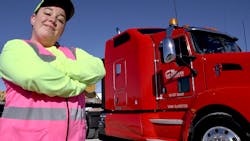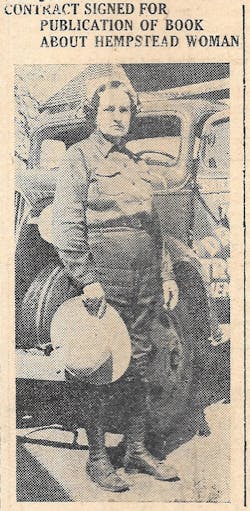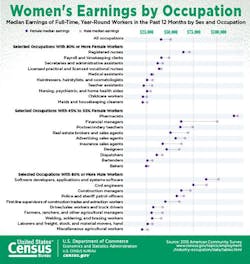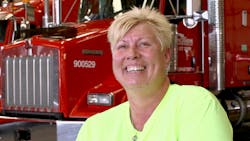Driving forces: Women taking on more lucrative trucker jobs
You hear complaints about today's truck driver shortage almost as much as you hear them about the weather. So why aren't more fleets and trucking companies trying to increase their drivers from the most obviously underrepresented population demographic among professional drivers out there: Women?
According to the U.S. Census Bureau, the nation is approximately 50.8% female and 49.2% men. And according to the group Women in Trucking (WIT), 93% of professional truck drivers are men and only about 7% are women. That's a glaringly disproportionate share-to-share representation of an entire gender.
It's partly because driving big trucks has traditionally been thought of as a "man's role" and done by men, one of those dirty jobs with heavy machinery some women would prefer not to do, just by the nature of it. Right?
Actually, not at all. "Little" women have been plenty big enough to handle big trucks as long as they've been around.
Ellen Voie, president and CEO of WIT, noted in a discussion on this topic last year that the first female CDL holder in the U.S. was Lillie Elizabeth Drennan. Drennan transported some of the most hazardous materials on the road: "She received her CDL in 1929 in Texas, hauling oil field equipment and explosives," Voie said.
"Women have had their CDLs for a long time, but still make up a very small part of the industry," she continued. Even though women have been driving trucks since decades and decades ago when the vehicles truly were very physically taxing to drive — that's certainly been changing with today's trucks — they "often feel that aren't qualified to do this job," Voie said.
Just like Drennan transporting highly dangerous cargo in her time, it turns out that statistically, women have shown a number of advantages over their male counterparts as drivers. For one thing, Voie explained, women are safer drivers overall than men and have fewer accidents.
Women also tend to remain with a carrier longer than men do, and many companies have noted that high driver turnover is not only costly due to training, onboarding and so on but can threaten safety if the driver workforce is constantly turning over and new drivers need to get up to speed with protocols and procedures.
Disparities
While women haven't reached the level among the professional driver population that their numbers suggest they should, W.M. "Rusty" Rush, president, CEO and chairman of commercial vehicle dealer Rush Enterprises, pointed out that Rush Truck Centers dealerships are seeing women make up larger and larger percentages of the workforces in truck sales, parts and management roles inside the office.
Those kinds of jobs are more appealing because — this is obvious — they offer a comparatively easier, more typical lifestyle; better work-life balance; and they often pay better and/or offer better career advancement.
There may be something to that: for women, if the office/ management side of trucking business is more the norm, the driver career would need to make sense financially or else just be more in character for a particular woman.
If you want to know why more women don't become truck drivers, look also at a few other stats from the Census Bureau. Among jobs the bureau tracked from 2000-2016 where men make up 80% or more of the total workforce, truck driver is among the lowest-paid, about on par with farmers, agricultural managers, welders and solderers.
The median income for female truck drivers as of 2016 was in the mid-$30k range, while the median income for male truck drivers was in the mid-$40k range, about 28.5% higher. Why take on a job that's more difficult if it doesn't even respect you enough to pay you the same it pays other workers to do the exact same thing?
As a result, the Census Bureau tracked workforce changes by gender for specific jobs over the 2000-2016 period and found that women's growth in other careers far outpaces their inroads into the truck driver role. Among veterinarians, for example, women went from around 35% of the workforce in 2000 to 60% in 2016, and among lawyers women made up under 30% in 2000 and rose to 40% in 2016.
Specialty/ heavy hauls
One trucking company — Lone Star Transportation out of Fort Worth, TX — has noticed a change that seems to make sense given the challenges women face as truck drivers. The specialized heavy-haul carrier transports flatbed, oversized, and extreme over-dimensional freight and said it has noticed more women applying to drive for the company.
The carrier believes this is happening because these specialty loads pay better, Lone Star CFO Kristi Williams said.
"Women truck drivers, like women in other fields, want to earn more money and respect in their careers," she said. "They want access to the same advancement opportunities as men. As a professional truck driver, that means taking on jobs in which they haul bigger, more specialized freight."
WIT's Voie pointed out that women today haul some of the most safety-sensitive loads. "You'll find them driving tankers, hazardous waste and extreme over-dimensional loads. Pay is a major consideration when women transition into moving larger freight, but so is the challenge it brings," she said.
Three Lone Star drivers told American Trucker that battling misconceptions about what female drivers can and can't do was something they were more than willing to take on.
Paula Stroud, who's part of Lone Star's four-axle tractor fleet qualified to haul freight of any length, width and weight, said stereotypes were chief among the obstacles she had to overcome to haul over-dimensional freight.
"I've heard 'A woman shouldn't be doing this.' 'It's not your place.' 'You shouldn't be out here doing a man's job, and certainly shouldn't be doing a man's job better than him,'" Stroud contended.
Sage Mulholland drove over-the-road several years for a major dry van carrier before deciding to drive flatbed.
"I may be just 5' 2", but I can strap, chain and throw 50-lb. tarps over loads as well as any other driver," she said. "I don't feel intimidated one bit, from hauling the small stuff to the big stuff. Just because I am a woman doesn't mean I'm not able to do something like this."
Mulholland admitted that the physical nature of driving heavy loads did concern her at first. "I did a lot of working out and strength training and stretching in preparation," she recalled.
Doreen Evans said physical demands of driving forced her to figure out how to adjust in common-sense ways.
"Being a woman, I've had to find different ways of using body mechanics to get everything done safely," she said. "I get plenty of exercise working. I enjoy my job and build strength as I am doing it."
Asked how male drivers she encounters act toward her, Evans said there's not much of an issue and that nearly all are respectful and positive. "But I have heard comments like, 'Get back in the kitchen.' My response has been, 'I actually have a fridge and microwave in my truck, so I take my kitchen with me.'"
"If any men try to give me a hard time," she said, "my response is, 'Look, this is my job — this is what I do, and I am quite capable of doing it without any input from you.'"
Lone Star's female drivers recommend the job to other women regularly.
"I tell them that if I can do it, anyone can," said Mulholland. "There will be tough times and you will get dirty, but it is very rewarding because it's uncommon for a woman. I show them how I still do my hair, makeup and nails. I even have a YouTube video that talks about it."
Evans told other women not to sell themselves short — she said she believes they can do this job well, even if they don't think they can.
"Women are quick to say 'Oh, I couldn't do that." I tell them if they raised kids they can do it," she said. "I gain more and more experience, and it gets easier with each haul."
About the Author
Michael Catarevas
Michael Catarevas is a former managing editor at FleetOwner. He wrote for the publication from 2017 to 2020.
Aaron Marsh
Aaron Marsh is a former senior editor of FleetOwner, who wrote for the publication from 2015 to 2019.



